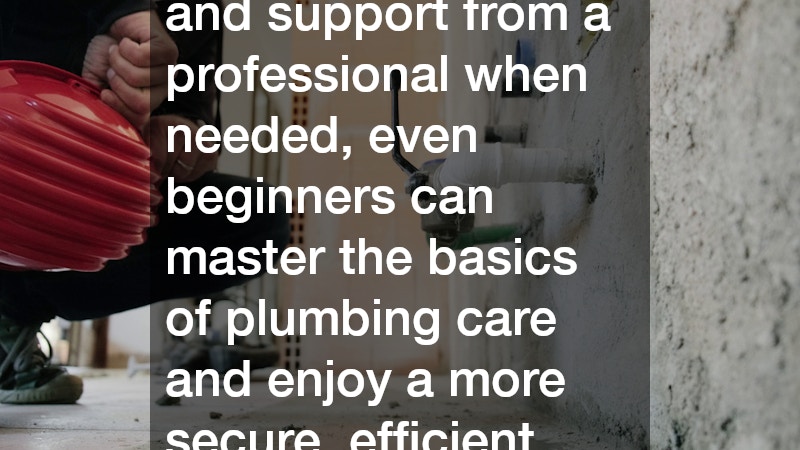Maintaining a home involves many responsibilities, and one of the most overlooked yet crucial areas is plumbing. It’s easy to ignore your pipes and fixtures when everything seems to be functioning smoothly, but proactive care can prevent costly repairs and water damage down the line.
Whether you live in a new build or an older house with character, understanding how to take care of your plumbing is essential for any homeowner or tenant.
Understanding Your Plumbing System
Before diving into maintenance, it’s important to have a basic grasp of how your plumbing system works. Most residential systems include a series of pipes that deliver clean water to your taps, showers, and appliances, and another set that removes wastewater. These networks are connected to either a municipal water supply or a private water tank, along with a drainage system. A water heater is often part of the system, ensuring warm water for showers, laundry, and dishwashing. Familiarising yourself with where your main water shut-off valve is located can save you in an emergency, such as a burst pipe or major leak.
Routine Inspections Make a Big Difference
One of the simplest yet most effective ways to maintain your plumbing is by carrying out regular inspections. Keep an eye on taps and pipes under sinks to detect slow leaks that could otherwise go unnoticed. Dripping taps and leaking pipe joints may seem minor, but over time, they can lead to water damage, mould growth, and higher water bills. Listening for unusual sounds like gurgling drains or knocking pipes, is another good habit. These sounds can indicate trapped air, blockages, or unsecured pipes needing attention.
Don’t forget to examine your water heater. If you notice inconsistent water temperatures or discoloured water, it might be time to flush the tank and remove sediment buildup. Hot water systems should be professionally serviced according to the manufacturer’s recommendation to maintain performance and safety.
Keep Your Drains Clear
One of the most common plumbing issues arises from clogged drains. Hair, soap scum, grease, and food waste can accumulate over time, causing blockages that may result in slow drainage or complete backups. To prevent this, avoid pouring fats and oils down the kitchen sink, and use strainers to catch debris in bathroom drains. If a drain becomes slow, try using a plunger or a natural cleaning mix like baking soda and vinegar before resorting to chemical drain cleaners, which can be harsh on your pipes and the environment.
If clogs persist, it may be necessary to call a professional. Persistent slow drainage could indicate a deeper blockage in the plumbing system or even damage to the sewer line, especially in older properties with tree root intrusion.
Be Mindful of Seasonal Changes
Seasonal changes can place different stresses on your plumbing. During colder months, exposed pipes can freeze and burst, especially in areas with little insulation. Insulating outdoor taps and pipes in garages or under houses can prevent freezing and costly repairs. During warmer seasons, increased water usage for gardens and pools may highlight leaks or weaknesses in outdoor plumbing.
After heavy rains, it’s also wise to inspect stormwater drains to ensure they’re not blocked by debris. Standing water around your property can lead to erosion and foundation issues, not to mention a breeding ground for mosquitoes. Keeping gutters and drains clear not only protects your home but also supports the overall function of your plumbing infrastructure.
Know When to Call a Professional
While routine maintenance is well within the grasp of most homeowners, knowing your limits is part of good plumbing care. If you encounter a burst pipe, sewage backup, or an unidentified leak, it’s best to contact a licensed plumber. Trying to fix complex issues without the proper training can lead to more damage, higher costs, and even safety risks.
Having a trustworthy local plumber on call means you’re prepared when emergencies strike. It’s also worthwhile to schedule a comprehensive plumbing inspection every few years, especially if you’re living in an older home. This proactive step can identify hidden issues like corroded pipes, faulty fixtures, or outdated systems before they become expensive problems.
Long-Term Habits for Better Plumbing Health
Building good habits around water use and fixture maintenance can go a long way in preserving your plumbing. Avoid flushing anything other than toilet paper to prevent blockages in your sewer system. Check washing machine and dishwasher hoses for signs of wear and replace them if needed. Even turning off taps gently can help extend the life of your fixtures and reduce wear on internal mechanisms.
A key part of responsible homeownership is understanding that plumbing is not something to “set and forget.” Just like any system, it requires occasional upkeep and attention. By adopting a maintenance mindset and recognising warning signs early, you’ll protect your property and save money in the long run.
In conclusion, plumbing maintenance doesn’t require advanced knowledge, but it does require consistency and awareness. From inspecting pipes and fixtures to managing drainage and preparing for seasonal changes, every small effort counts. With the right habits and support from a professional when needed, even beginners can master the basics of plumbing care and enjoy a more secure, efficient home.

